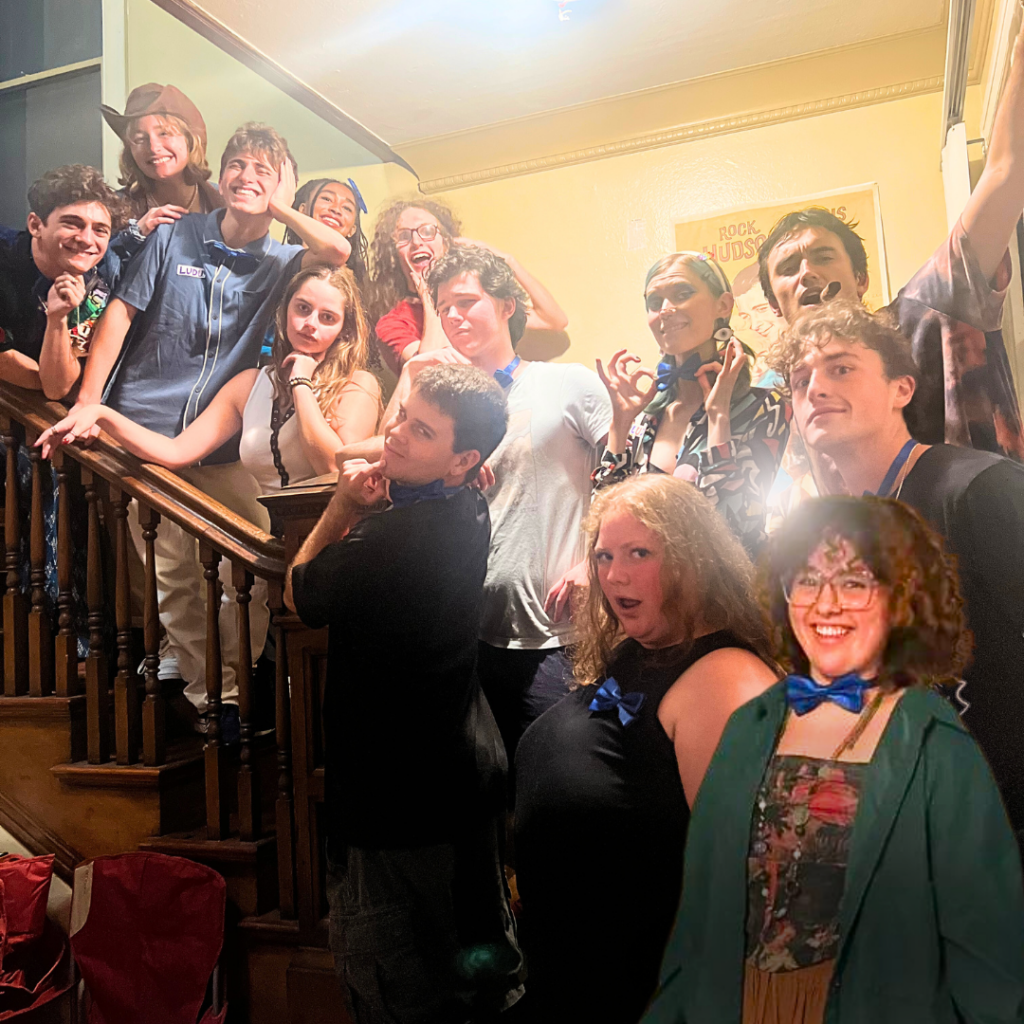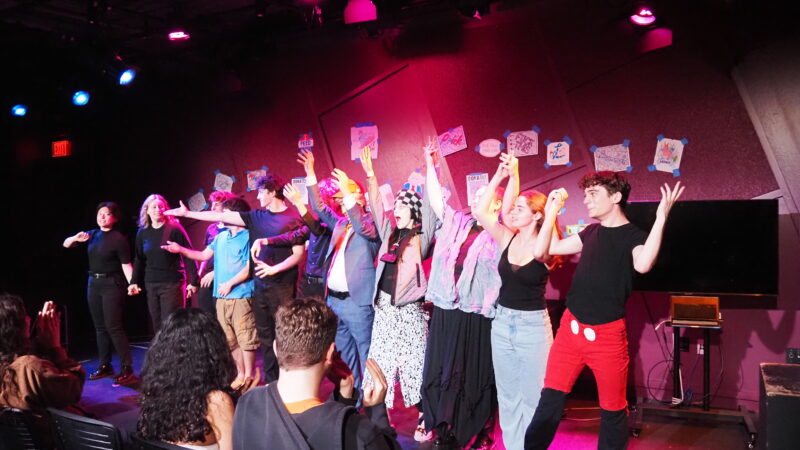“It’s supposed to mean ‘laughter is the best medicine,” said Ludus Remedium’s president and co-founder, Helen Culpepper (BA Narrative Studies ’25).
Their explanation for the group’s name—derived after a hasty Google Translate query—elicited laughter from their Latin-speaking colleague, Alec Schwartz (BFA Acting for Stage and Screen ‘28). Soon, Culpepper and the rest of the members joined in the laughter.
“They’re laughing,” Culpepper said. “At least they’re experiencing joy right now.”
For Ludus Remedium, an independent student comedy group with a short history and a big impact on campus, experiencing joy is the whole point. It’s right there in the name.
The group takes the concept of laughter as medicine seriously. Formed after a period of intense soul-searching by co-founders Culpepper and Kealy Tracy (BA Narrative Studies ’26), Ludus Remedium operates as a safe space for its members, combining elements of comedy, mental wellness and political activism.
“Ludus is such a safe place,” explains EDIA Coordinator Sydney Linko (BA Theatre, Emphasis in Comedy ’26). “I’ve never been in an environment where you can create in the way we do. We always love to pump up each other’s work. It’s such a supportive group and environment, and I’m so thankful to be a part of it.”
“The group has a strong sense of its own identity and knows what it wants to be,” added Schwartz. “The people who want to be here will be here.”
Based on a theory of “sympathetic joy” posed by author Sharon Salzberg, Ludus Remedium operates on the principle that there is an infinite amount of joy in the world—and that one person’s happiness or success does not take away from another’s. At their weekly improv shows, which take place on Wednesdays at 5:00 pm at the Hutton Park Stage, they practice a unique form of improv they created themselves: taking seemingly small details from audience members’ lives and blowing them up into bold, beautiful and bizarre scenarios. The goal is to make audience members see their lives in a different light.
“There is no finite amount of joy in the world. It can be experienced by one person, and just because they’re experiencing that joy, it doesn’t take away joy from you,” explains Culpepper. “So I started watching all these comedy shows that, before, I had felt jealous and upset about. ‘Why am I not as successful as this person?’ And, instead, being happy for them.”
As such, the group centers the audience.
“We wanted to base it on the audience being everything, and focus on people leaving the show feeling better about themselves than when they sat down,” Culpepper explains. “We wanted to erase that sense of comparison.”

Creating a space for comedy
Members of Ludus Remedium have received some practical help in this respect from their faculty advisor, SDA Professor Zachary Steel. In their attempt to bring joy to as many people as possible, the group has turned to clowning, partially influenced by participation in Professor Steel’s medical clowning class. Professor Steel also organizes annual workshops for members of the group, teaching them to push the boundaries of their comfort zones and be confident in their comedy through clowning.
“Not everyone in our group has taken clowning, but it’s great for us to have a professional helping us,” said Tracy. “We’ve taken workshops with Zach, and he’s helping us with the idea of confidence-building and the idea of being assured of our comedy, being willing to be ridiculous. He’s been wonderful for us, and we couldn’t wish for a better faculty adviser.”
The group also incorporates political activism into their comedy, and in its short time on campus, has built deep relationships with organizations like Fringe Benefits Theatre. Ludus Remedium are planning a series of peaceful, comedy-based street performances in the coming semester, and frequently include political activism as subject matter for their comedy.
“They are to promote peaceful activism, in a fun and funny way,” Culpepper explained of the planned street performances.
First and foremost, though, is the group’s focus on providing a safe space for making comedy with an emphasis on supporting the mental health of its members. Toward this end, Ludus Remedium strives to create an environment of mutual support and conducts firm, regular check-ins about open communication and physical boundaries.
“We’re doing improv—which is not scripted!” explained Culpepper. Regular check-ins about how people are feeling and an open communication about boundaries, they said, “allow people to say what they’re comfortable with, and establish a good physical relationship with everyone.”
“I was very comfortable,” said Schwartz, who joined the group at the beginning of this semester. “I felt an instant sort of compatibility and comfort level here.”
Members of Ludus Remedium stressed that the group’s impact on their lives stretched well beyond the stage. Linko reported that joining the group inspired her to pursue comedy more seriously.
“I fell in love with Ludus and the art of theatre so deeply that I changed my major from Biology to the Dramatic Arts with an Emphasis in Comedy,” she said. “Auditioning for Ludus is the best decision I have ever made.”
In addition to their regular improv shows, Ludus Remedium organizes a regular sketch comedy show each semester. This semester’s performance will take place over a weekend in early November at the Stop Gap Theatre, the new cabaret-style performance space that opened with the School of Dramatic Arts’ newly constructed Dramatic Arts Building.
While Ludus Remedium’s impact on campus continues to grow, their focus on the founding principles of creating “sympathetic joy” for audience members and for using comedy as a tool for mental wellness remains unchanged. “[Ludus Remedium] gave us this space to be together, to be friends and to feel like a comedy family,” Tracy said. “We created this space.”
